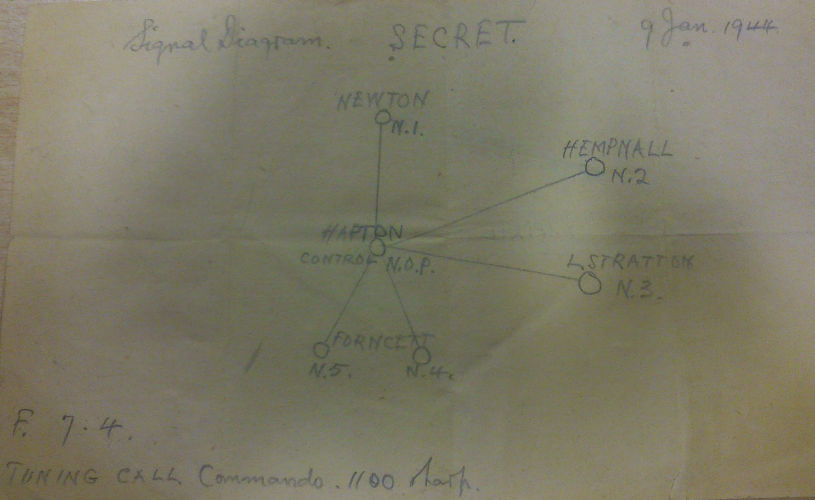
The History of Our Village Through Time
Written by Tim Ward
On 14th May 1940 the call went out for all 17-65 year-old able-bodied men, who weren’t already in military service, to step up for the defence of the Realm, should the enemy sneak in behind our troops. Newly appointed War Minister Anthony Eden made the broadcast on the BBC, calling for volunteers for the newly-formed Local Defence Volunteers (LDV) – variously (and cruelly) referred to by comedians of the time as “last desperate venture”, “long-dentured veterans” or “look, duck & vanish”(1).
Applications flooded in, in many cases ignoring the age range, one of which was Harry Duffield, whose wife later went on to be headmistress of Hapton school in the late 1960s/early 1970s, and whose papers these are(2).
Enrolled on 18th July 1940, at the age of 36, Mr Duffield had achieved all his proficiencies by 2nd May 1943 and was duly promoted to Sergeant less than six months later, on 15th October 1943.
The local Home Guard, as they went on to become known, were headquartered at Hapton Hall under Lt-Col R J Read.Surround each paragraph with the "p" tags used here. Doing that creates a paragraph break.

A lot of time seems to have been spent on training – from the correct paperwork to expect at road blocks to how to identify British planes to vehicle markings (friend or foe) to anti-gas measures (it’s a wonder they had time to do any work!), although the TV company of Dad’s Army would at least have been excused Drill, as was anyone over the age of 52. Mr Duffield was the officer responsible for the general training of No. 2 Company, and it was his job to make sure volunteers were keen & efficient. Others would come in to give training on specifics like firearms or bombs(3).
In the event of air raid or invasion, Mr Duffield’s job was to ring the church bells in order to raise the alarm, the message being carried locally by “cycle orderlies”. The remainder of the battalion would gather at Hapton Hall for further orders. No doubt the unit would have been called into action when the land mine went off near to Hillside Farm, which was sufficient to move the house on its foundations.
There can be no doubt that the men of the Home Guard risked their lives on a daily basis providing an invaluable service to the War, and each was subject to Military Law under the Army Act.
Not everyone died on the front line, however, Dennis Woods, who died in a motorcycle accident whilst serving with the 3rd Battalion, who were based in Loddon. He was leaving Long Stratton for Tasburgh and was hit by a military truck. He is buried in St Margaret's Churchyard, having received full military honours at his funeral
For those who were fortunate enough to make it through to VE Day, the Battalion organized a “Stand Down” supper.
REFERENCES
(1) Carroll, D. (2002) Dad’s Army, The Home Guard 1940-1944, Stroud, The History Press
(2) NRO ACC 2007/49 Papers of Sergeant Harry Thomas Shrewsbury Duffield, No. 2 Company, 14th Battalion, Home Guard, Norwich Record Office
(3) Horne, F. (2005) Armaments in Norfolk – WW2 People’s War, BBC http://www.bbc.co.uk/history/ww2peopleswar/stories/41/a4045141.shtml (accessed 31/12/2017)
“'WW2 People's War is an online archive of wartime memories contributed by members of the public and gathered by the BBC. The archive can be found at bbc.co.uk/ww2peopleswar”
We make every effort to document our research. If you have something you would like to add, please contact us.